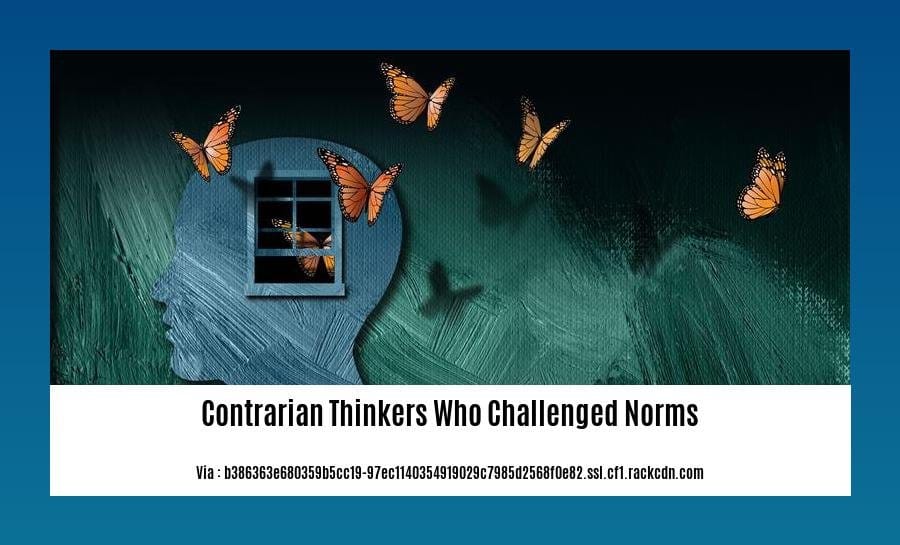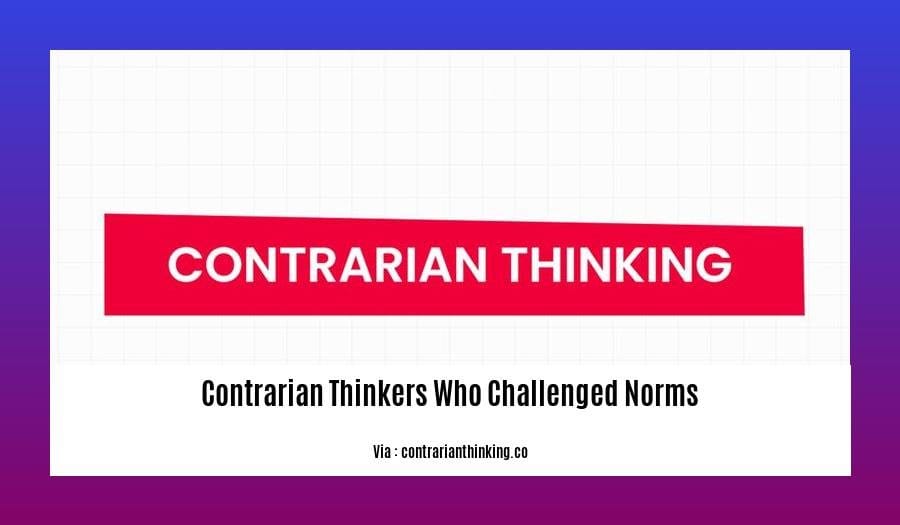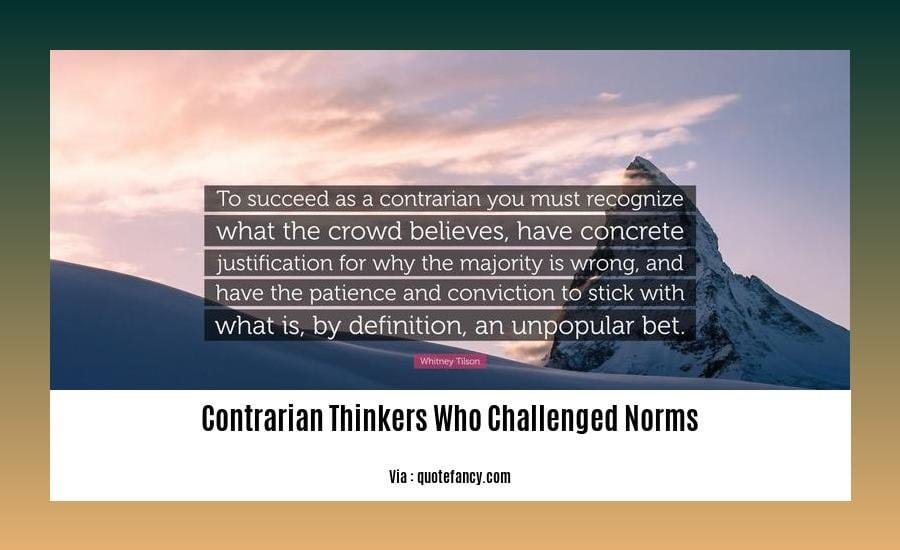In a world often stifled by conformity, there emerge beacons of dissent—contrarian thinkers who dare to challenge the established order. Their bold ideas and unwavering convictions have shaped the course of history, pushing us to question the unquestionable and forge new paths forward. Join us as we explore The Bold and the Brave: Contrarian Thinkers Who Challenged Norms, whose brilliance and resilience have left an indelible mark on our collective consciousness.
Key Takeaways:

- Contrarian thinking involves challenging established beliefs and questioning the status quo.
- Contrarians often face opposition due to their unconventional views.
- Contrarian thinking encourages critical thinking, a balanced perspective, and innovation.
- Galileo and Martin Luther King Jr. were examples of contrarians who had a profound impact on their fields.
Contrarian Thinkers Who Challenged Norms
They say wisdom lies in the majority, but history is replete with examples of contrarian thinkers who challenged norms and sparked revolutions in thought and action.
Galileo Galilei, the father of modern science, dared to challenge the geocentric model of the universe, proposing instead the heliocentric model. Despite facing persecution from the church, Galileo’s ideas laid the foundation for modern astronomy.
Martin Luther King Jr. is another shining example of a contrarian thinker. In a time of racial segregation and injustice, King preached nonviolent resistance, inspiring a movement that changed the course of American history.
Contrarian thinkers often swim against the tide, questioning established beliefs and proposing alternative perspectives. They challenge the status quo, pushing us to think critically and reassess our assumptions.
Of course, contrarian thinking can be met with resistance and even hostility. Those who hold onto conventional wisdom may see contrarians as troublemakers or even threats. But it is precisely this willingness to challenge the norm that drives progress and innovation.
Contrarian thinking encourages us to:
- Think critically: Questioning established beliefs helps us develop a more nuanced understanding of the world.
- Consider multiple perspectives: By challenging the status quo, we open ourselves up to different viewpoints, fostering a more balanced perspective.
- Foster innovation and progress: Contrarian ideas can challenge conventional wisdom and lead to breakthroughs and advancements.
While contrarian thinking can be challenging, it is essential for intellectual growth and societal progress. By embracing the ideas of those who dare to challenge the norm, we can break free from the constraints of conventional wisdom and create a better future.
Find out how pioneers celebrated for questioning the status quo broke through barriers, and learn about the forward thinkers who pushed boundaries. They dared to be different and achieved great things. Read about mavericks who dared to be different and get inspired by their stories of innovation and courage.
Strategies and Tactics of Successful Contrarian Thinkers
In the realm of thought leadership, contrarian thinkers stand out as pioneers who challenge established norms and ignite paradigm shifts. Their ability to see beyond the conventional wisdom and propose alternative perspectives has shaped the course of human progress. Uncovering their Strategies and Tactics offers valuable insights into how they navigate the complexities of challenging the status quo.
Key Takeaways:
- Question assumptions and seek overlooked opportunities.
- Prioritize creativity over competition.
- Compete through being unique.
Embracing Measured Risk-Taking
Contrarian thinkers are not afraid to venture beyond the comfort zone of conventional wisdom. They recognize that embracing measured risk is essential for unlocking transformative ideas. By stepping outside of established boundaries, they open themselves up to the potential for groundbreaking discoveries.
Connecting the Dots Across Different Domains
Successful contrarian thinkers possess an uncanny ability to connect seemingly disparate domains. They draw inspiration from diverse fields, synthesizing knowledge to form novel insights. This cross-disciplinary approach enables them to identify hidden patterns and uncover overlooked opportunities.
Prioritizing Creativity over Competition
In a world often driven by competition, contrarian thinkers choose to prioritize creativity. They understand that true innovation stems from thinking outside of traditional frameworks. By embracing their own unique perspectives, they create products, services, and ideas that disrupt the market and challenge existing norms.
Competing Through Uniqueness
Rather than imitating established players, contrarian thinkers compete through uniqueness. They differentiate themselves by offering something truly different that meets the unmet needs of the market. This strategy allows them to carve out their own niche and establish a loyal following.
Focus on Sustainability and Ethical Disruption
Successful contrarian thinkers recognize the importance of sustainability and ethical considerations in their endeavors. They strive to create solutions that not only challenge norms but also contribute positively to society and the environment. By integrating ethics into their approach, they build trust and credibility with their audience.
Conclusion
The Strategies and Tactics of Successful Contrarian Thinkers provide a roadmap for those who dare to challenge established norms and shape the future. By embracing measured risk-taking, connecting the dots across domains, and prioritizing creativity, they ignite innovation and progress. Their unique perspectives and unwavering commitment to ethical disruption leave an indelible mark on the world.
Citation
Think Different, Win Big: The Contrarian Entrepreneurial Path
Impact of Contrarian Thought on Cultural and Intellectual Landscapes
In the tapestry of human history, contrarian thinkers stand as bold outliers, challenging established norms and reshaping the very fabric of our cultural and intellectual landscapes. Their voices, often dismissed as eccentric or heretical, have nevertheless sparked revolutions in thought, art, and society.
Challenging Conventions
Contrarians play a vital role in questioning accepted truths and pushing the boundaries of knowledge. They defy the tyranny of groupthink and refuse to accept the status quo. Their dissent often leads to transformative discoveries and paradigm shifts that redefine our understanding of the world.
Embracing Uncertainty
Contrarians recognize the inherent unpredictability of life. They reject rigid adherence to plans and instead focus on identifying singularities and patterns that others may miss. This ability to navigate chaos and embrace uncertainty proves invaluable in diplomacy and complex decision-making environments.
Fostering Intellectual Curiosity
Contrarian thinking sparks a relentless thirst for knowledge. It encourages us to seek alternative viewpoints, challenge assumptions, and continually expand our perspectives. By questioning the conventional wisdom, contrarians pave the way for intellectual growth and societal progress.
Enhancing Decision-Making
In a world of conflicting opinions, contrarians offer a valuable lens for making informed decisions. They challenge assumptions, seek diverse perspectives, and embrace uncertainty, ultimately leading to more nuanced and resilient decision-making.
Benefits of Contrarian Thought
The impact of contrarian thought extends far beyond its role in intellectual discourse. It promotes creativity, innovation, and societal progress by:
- Encouraging critical thinking and healthy skepticism
- Providing unique insights and alternative perspectives
- Breaking down barriers and challenging the status quo
Key Takeaways:
- Contrarians challenge established norms and inspire change.
- They embrace uncertainty and navigate chaos effectively.
- Contrarian thinking fosters intellectual curiosity and promotes continuous learning.
- It enhances decision-making by encouraging perspective diversity and embracing uncertainty.
- Contrarian thought promotes creativity, innovation, and societal progress.
Citation:
Case Studies of Influential Contrarian Thinkers
Prepare to be astounded as we unveil the captivating stories of contrarian thinkers who dared to challenge norms and reshape our world. These outliers, armed with their unique perspectives and unwavering determination, embarked on extraordinary journeys that left an indelible mark on history.
Key Takeaways:
- Contrarian thinkers question established beliefs and seek alternative viewpoints.
- They’re willing to challenge the status quo and embrace unconventional ideas.
- Their insights often lead to innovative breakthroughs and societal progress.
Challenging Conformity
Contrarians possess an insatiable curiosity that fuels their relentless pursuit of alternative perspectives. They question the status quo, believing that the popular consensus isn’t always right. Their skepticism leads them to uncover hidden truths and challenge conventional wisdom.
Embracing Disruption
Contrarians aren’t afraid to shake things up. They embrace disruption as an opportunity for innovation. Their willingness to challenge established norms leads to groundbreaking ideas that can revolutionize industries and transform society.
Inspiring Change
The impact of contrarian thinkers extends far beyond their own ideas. Their ability to challenge conventional wisdom inspires others to question their beliefs and consider new possibilities. This creates a ripple effect of innovation and progress that benefits us all.
Notable Case Studies:
- Galileo Galilei: Challenged the Earth-centered model of the universe, leading to the development of modern astronomy.
- Martin Luther King Jr.: Championed nonviolent resistance against racial injustice, inspiring the civil rights movement.
- Steve Jobs: Defied industry norms with innovative products like the iPhone and iPod, revolutionizing the tech world.
Citation:

FAQ
Q1: Who are some notable examples of contrarian thinkers?
A1: Galileo Galilei, Martin Luther King Jr., and Steve Jobs exemplified contrarian thinking by challenging established norms and sparking revolutions in science, society, and technology.
Q2: What are the benefits of embracing contrarian thinking?
A2: Contrarian thinking can foster critical thinking, encourage a balanced perspective, and drive innovation and progress by questioning assumptions and seeking alternative viewpoints.
Q3: Why do contrarian thinkers often face challenges?
A3: Contrarian thinkers may encounter resistance due to their divergent viewpoints, which can lead to disagreements and conflicts with those who prefer conformity.
Q4: How can contrarian thinking contribute to social and scientific advancements?
A4: By challenging the status quo and proposing alternative ideas, contrarian thinkers have played a crucial role in推动 scientific discoveries, societal reforms, and technological breakthroughs.
Q5: What are some key strategies employed by contrarian thinkers?
A5: Contrarian thinkers often challenge assumptions, embrace measured risk-taking, and connect the dots across different domains to uncover overlooked opportunities and drive innovation.
- China II Review: Delicious Food & Speedy Service - April 17, 2025
- Understand Virginia’s Flag: History & Debate - April 17, 2025
- Explore Long Island’s Map: Unique Regions & Insights - April 17, 2025
















